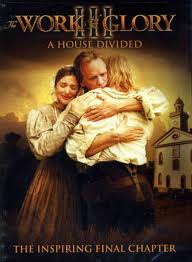|
The Work and the Glory III: A House Divided
Click here to go to the official site.
 The Work and the Glory III: A House Divided, is the third installment of a film series based on Gerald N. Lund’s novels. This particular piece, as with most (if not all) LDS flicks, featured a mini love story in the midst of another dramatic tale. You would never know from the opening scenes that this is a Mormon film, which to its credit made the film slightly more enjoyable to a non-Mormon (I say "slightly more enjoyable" because this was a very unconvincing film in most regards). The opening romance story sets the precedent for the entire film; it was quite a bland romance that left the viewer rather unattached to the two most important figures for the remainder of the film. The Work and the Glory III: A House Divided, is the third installment of a film series based on Gerald N. Lund’s novels. This particular piece, as with most (if not all) LDS flicks, featured a mini love story in the midst of another dramatic tale. You would never know from the opening scenes that this is a Mormon film, which to its credit made the film slightly more enjoyable to a non-Mormon (I say "slightly more enjoyable" because this was a very unconvincing film in most regards). The opening romance story sets the precedent for the entire film; it was quite a bland romance that left the viewer rather unattached to the two most important figures for the remainder of the film.
The story unfolds with Joshua Steed (Eric Johnson) arriving at a booming town in Missouri to continue business in the cotton industry, which had previously made him a fortune. He meets the debonair Ms. Mendenhall (Meredith Salenger), falls in love with her, and gets married. The amount of time devoted to character development and the relationship between the two was rather short lived, and the half-hearted emotion from the two made their love for each other very unconvincing.
The story continues with Ms. Mendehall discovering that her husband has family that had joined the "Mormonites" (a nickname given by the "anti-Mormons") and moved out to Kirtland, Ohio. It is pretty clear that Joshua is embarrassed by his family (even though it is not clear exactly why), and has no desire to join them. As it turned out, the Mormons migrated to Kirtland to flee from persecution and find a place they could call Zion, but to their misfortune they only experienced more grief. The film does a fair job at revealing some of the historical blunders that Joseph Smith and the early Church leadership made--practically going bankrupt, creating their own (illegal) money through a failing bank, and members losing their land they had mortgaged to support the Church finances. From the perspective of a non-Mormon, it was refreshing to see that the producers made a point to reveal a decent amount of tension that had built up within the Church body, and it portrayed a somewhat honest take on that reality. On the other hand, it seemed as though the film always found a way to minimize negative issues.
In the pursuit of trying to establish a Church that was experiencing growing pains and other various trials, including "intense persecution," the congregation had decided to venture out to Missouri to establish Zion. Due to the poor reputation of the Mormonites, they were not welcome in Missouri. At the request of the Governor, Joshua Steed was put in charge of an "anti-Mormon" brigade that would attempt to drive the Mormonites out of Missouri. Tensions grow between Joshua and his wife as she finds out that her husband is off to push the Mormons out, which included his own family.
The fact that the film never revealed why the Mormons were unwelcome every place they visited bears testimony to an intense bias in regards to the circumstances. One would get the impression that people hated the Mormons for no particular reason at all, and that the Mormons received the backhand of justice simply because they were Mormons. Surely there was a threat posed by the Mormons, otherwise there would have been no reason for such a reaction by other homesteaders. The film did a lousy job at revealing these under-girding issues, and it makes the viewer suspect that the producers were either ignorant or had an agenda to manipulate the viewer. Unfortunately the producers made this habit all throughout the film.
After many turning of events, Joshua Steed comes to a point of realization that he must accept his family the way they are, and forsake this mad drive against the Mormons. In the end, forgiveness becomes the film’s forte; relationships are mended, truth is realized, and ultimately Joshua Steed is baptized as a Mormon. Although the film was extremely biased towards Mormonism and truth was reduced to a warm fuzzy, the viewer can at least see the importance of forgiveness and love, especially in circumstances where relationships are stretched to their limits.
This film will not appeal to non-Mormons, except for those perhaps who want to learn more about the LDS film genre.
Matthew Vessey
Treasurer, Courageous Christians United
PerfectRighteousness.com
October 8, 2007
|